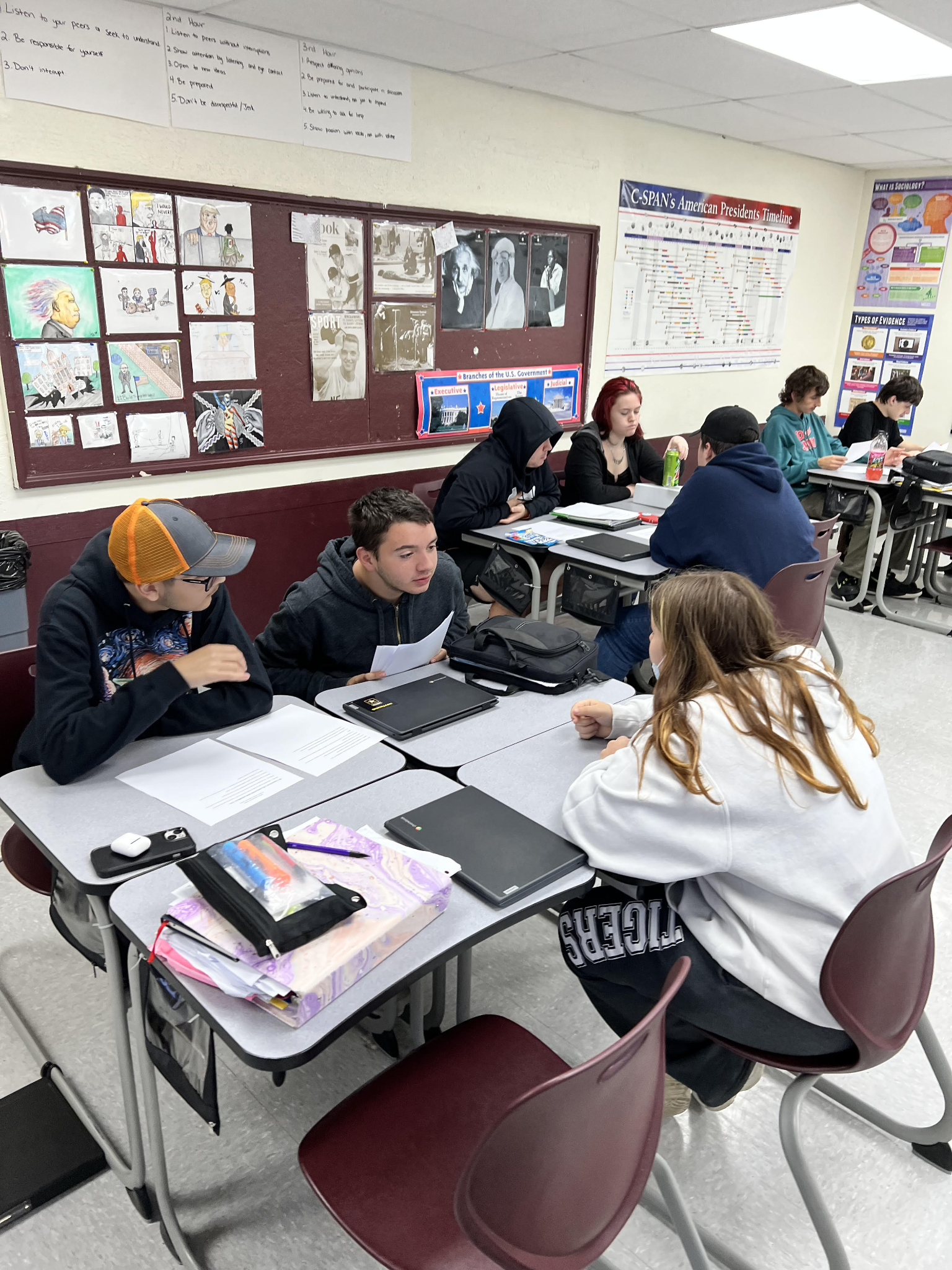Does Congress Represent Me? Students Use Simulations to Understand How Congress Works

Simulations of democratic processes are a proven practice of civic education embedded in the Illinois 6-8 and 9-12 civics course requirements. Simulations of democratic processes allow students to “do civics” in a safe environment to learn and practice knowledge, skills, and dispositions necessary to navigate and understand institutions of power.
Logan Ridenour, a high school social studies teacher at Dupo Jr/Sr. High School engaged his students in a mock legislative hearing to explore the essential question, “Does Congress represent me?”
Logan, an Illinois Civics Hub Regional Instructional Coach for St. Clair, Clinton, Marion, Jefferson, Perry, Randolph, Jackson, Union, Monroe, Alexander, Washington, and Pulaski Counties, earned his Gold badge in the Guardians of Democracy Microcredential Program in simulations of democratic processes and has served as a facilitator for Bronze badge level courses.
We asked Logan to share his reflections on engaging students in simulations. Here are his responses.
Briefly describe your topic for your simulation.
The students were studying the work of Congress and the essential question, “Does Congress represent me?” prompted students to create bills to address issues/changes that they felt were important to their school environment.
What strategy did you use for this simulation? Why did you choose this strategy?
Students engaged in a multi-day legislation activity. Students were tasked with crafting a bill (following a template) to address an issue within the school. Students then submitted their bills, and they were studied in a subcommittee. Each subcommittee submitted two bills that they believed should be addressed. Students then could look for the opportunity to refine their bills and add co-sponsors before the committee hearing. The committee hearing was held, and students defended their bills to staff members and administration. We used this simulation to engage the students in discussing their bills and allow staff and administration members to serve as committee members. This allowed students to testify about the purpose and necessity of their bills. It also allowed administrators to hear directly from students about school-related issues important to them.
How did students gain the necessary background knowledge for this simulation?
Students were given direct instruction on the purposes of committees in Congress and their functions. Students studied the bill-making process and its path through both houses of Congress. Students also researched their representatives and the committees and bills they supported in Congress.
How did this activity deepen students’ disciplinary content knowledge and/or meet learning targets?
Students were able to understand the difficulty of passing legislation through Congress and experience a hearing and the type of questioning that occurs within a hearing. Students explored how building support for a bill/cosponsorship strengthened their cause when it came to increasing the chances of passing a bill.
The project allowed students to develop their ability to advocate for themselves within the school community. It allowed them to propose change and then work with other students to refine their ideas and develop their testimony for the hearing. It also allowed them to consider other students and their abilities within their school community. The questions during the hearings led students to go back and adjust their bills based on the suggestions of the committee chair/co-chairs (teachers and administration.)
What comes next? What did students identify as future opportunities to address issues of concern?
Many students asked about a further discussion with administrators about the issues brought up in the hearings. Students approached the new advisor for the student voice committee and asked her if they could join and how they could use the group to get the ball rolling on the issues.
What advice would you give teachers thinking about opportunities for engaging their students in classroom simulations of democratic processes?
Simulations are very rewarding, and I suggest that you find ways to incorporate them into your classroom. My students always enjoy these activities, which create a way for students to understand the material and put it into practice. Here are a couple of quotes from students’ reflections.
- I learned that: a) there’s a lot more work that goes into the entire process; b) The wording is hard to get in that formal way; c) passing a bill isn’t easy in the slightest; d) if your bill isn’t near flawless or can easily be fixed, it’ll be destroyed entirely. Overall though, it was super fun and eye-opening.
- I learned the intricacy of house and senate hearings and how difficult it is to propose a new bill. My bill involved adding an extreme minute to the school’s passing periods, from 4 to 5 minutes. When I got up to speak for my bill, the committee all brought very good points to the table on how it may not work and how it could be improved. It was very… enlightening. I hope that at the end of our school year, I will get the opportunity to speak with the same seriousness I was given during the simulation. I liked it, 10/10
